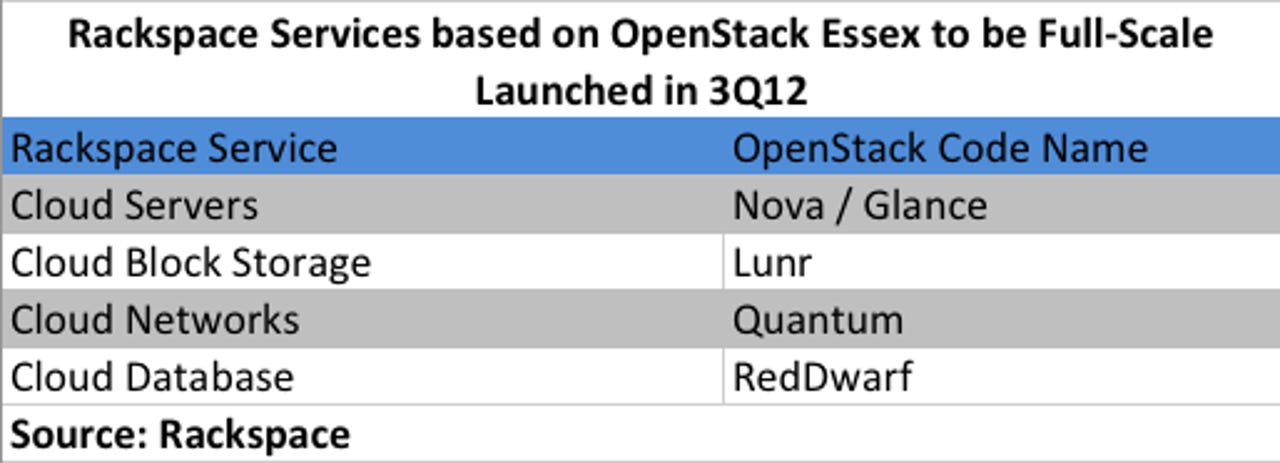Rackspace's great OpenStack experiment nears lift-off

Rackspace's move to the 2-year-old OpenStack cloud platform is poised to commence Aug. 1 and the transition is being closely watched as it'll affect everything from customer service to earnings to the company's position in the market.
How important is OpenStack for Rackspace? Wall Street analysts are all over the map on Rackspace's move. Generally speaking, analysts are supportive, but worry about migration risk as well as earnings. On the upside, Rackspace's move to OpenStack coincides with a series of services that will move the company closer to being a cloud business akin to Amazon Web Services. Today, most of Rackspace's revenue comes from traditional hosting.
Rackspace is expected to garner small loads on its OpenStack platform and then a bigger piece of the cloud computing pie in the fourth quarter. Analysts also expect Rackspace to hold its own as HP, Google and Amazon Web Services offer public cloud services. Why? Rackspace's support will be a differentiator.

William Blair analyst Jim Breen said in a research note:
While there has been much concern recently about potential delays of the open-source-based cloud platform, we believe that concerns have escalated beyond what is reasonable in terms of implementation and investors are losing sight of the growth potential of its core business. Rackspace’s managed hosting business has not shown any signs of slowdown and OpenStack has the potential to accelerate the cloud business in 2013.
We caught up with Rackspace general manager Jim Curry to talk about OpenStack as it nears the Aug. 1 launch date. Here are the key points:
The migration. Starting Aug. 1, Rackspace will offer new customers cloud services based on OpenStack. Current cloud customers will be migrated to OpenStack on a yet-to-be-determined timeline. Legacy hosting customers aren't on OpenStack.
Customer migration details to be determined. Curry said that the goal is to make migration to OpenStack "relatively painless." "We don't want to push customers before they are ready," said Curry. "The transition will occur over months and quarters." Curry emphasized that Rackspace has made its name on support so it will make the migration easy. In other words, the goal is to have customers turn off legacy cloud services and swap over to OpenStack in minutes.
OpenStack will give Rackspace another avenue into private cloud services to drive enterprise adoption. "The cloud is often mistaken for the public cloud," said Curry. "But for the enterprise cloud is an architecture and a service model."
Should we worry about NASA's OpenStack support? NASA raised a few OpenStack eyebrows in recent months with two blog posts. In one post, Acting NASA Ames Research Center CIO Ray O'Brien said that the space organization was paring back its OpenStack development efforts. Then NASA CIO Linda Cureton noted that the agency was using Amazon Web Services. The concerns are generally overblown.
For starters, Adrian Gardner, CIO of the Goddard Space Flight Center, said that NASA was merely harvesting the code it opened up to the community to develop. Gardner, who spoke at the Temple Fox School of Business IT Awards in the Spring, said NASA's plan was to contribute code and then become a consumer after OpenStack was developed.
Curry also indicated that NASA had been an Amazon Web Services customer for years to hold images. "An Amazon endorsement isn't a (knock) on OpenStack," said Curry. As for becoming an OpenStack consumer, Rackspace could theoretically do exactly what NASA has done in the future. "NASA is harvesting and I could see a world where the same thing happens at Rackspace. We could become a consumer of it as well. We don't monetize software. We monetize support on top of that. If the code is moving forward and we can't contribute much we could become a consumer of OpenStack," said Curry. "Realistically would we back away from OpenStack? No. OpenStack is something we feel very attached to."
More:
OpenStack's prospects: Red Hat, VMware agree to disagree